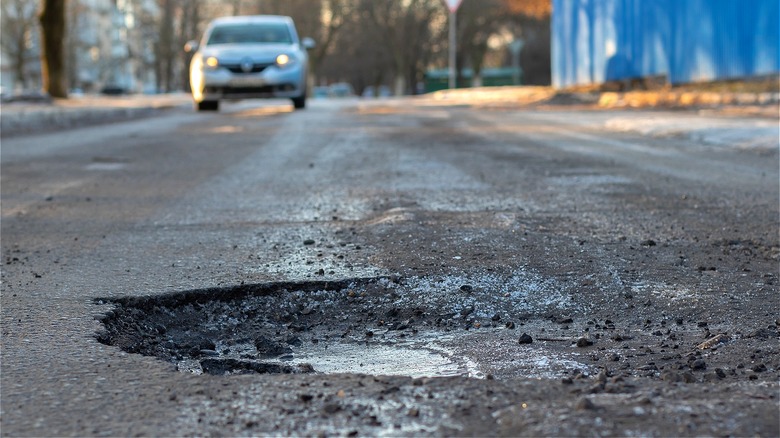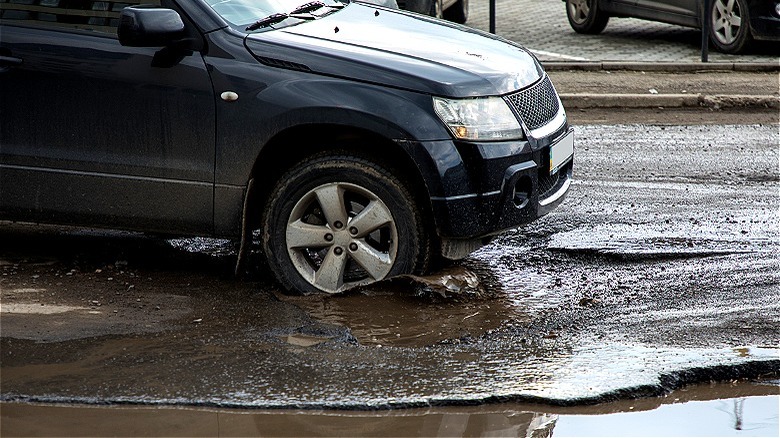Can You Get Reimbursed For Pothole Damage?
While infrastructure might not be the most exciting topic, it has a huge impact on our day to day. In fact, an important part of President Biden's sweeping Build Back Better agenda was the inclusion and passing of the much-needed Bipartisan Infrastructure Deal. When this $1.2 trillion bill passed in late 2021, it excited those with an eye on crumbling infrastructure across the country. However, repairs take time and it could still be a while before the average person notices a real difference in their daily life. In the meantime, potholes and general road and sidewalk damage have become an increasing part of many American's everyday reality. While the Chicago rat hole might have become a beloved tourist destination in early 2024 (RIP), many of the road damage instances, like potholes, that you might encounter can cause serious damage to your car.
According to USA Today's analysis of Google Trends data for 2020 through 2023, Washington state has the biggest pothole problem, but according to the White House, the problem is much larger than a single state. Per the White House, one in five miles of highways and major roads (along with 45,000 bridges) across the United States are in poor condition. This can lead to an increase in accidents, not to mention a rise in pothole-related car damage. A 2022 AAA survey found that the average cost of pothole-related repairs was almost $600 per repair. AAA also found that pothole-related damage cost drivers $26.5 billion in 2021, with many drivers facing an average of two pothole-related repairs in a year.
Seeking reimbursement for pothole damage
It's technically possible to seek financial reimbursement from your city, county, or state related to pot-hole-inflicted damage, but it can be tricky. There's a lot to know about the specific jurisdiction the roadway in question might fall under. If you're seeking reimbursement for car damage as a result of road conditions, you first have to file an administrative claim with the specific government agency that's responsible for maintaining the road in which the damage occurred. Note that local roads are usually maintained by either your city or county, whereas highways are generally the responsibility of your state. The federal highway system, meanwhile, along with interstates, are maintained by the federal government. Once you've determined the correct government agency, you can then file the appropriate claim (some might even have their own specific claim form to file).
At that point, the agency you've filed with has a set amount of time to respond, depending on your state, city, or county's rules. For example, claims in California must be responded to in 45 days. The agency can choose to do one of a few things. The first, is it can agree to pay you some or all of the requested damages, thereby avoiding the need to go to court. However, the agency can also choose to reject your claim or pay less than your requested amount, giving you a limited time frame to file an official lawsuit in court to try and recuperate the damages.
Other things to know about pothole claims
If a pothole or other roadway damage causes you to experience an accident, you could pursue suing your city, county, or state, for injury. Yet, unlike in personal injury lawsuits where you have several years to file a claim, the statute of limitations for state or local government is short. Depending on the laws of your specific area, you could have as little as 30 days after your injury to file (note that some places might allow 60, 90, or 120 days). The process for suing for injury differs from a damage claim in that you must file a notice of claim with every individual and/or entity that caused the injury. You also have to wait for the notice of claim period to end before you can pursue a formal lawsuit. It can be extremely helpful to look up the specific governmental immunities for your state, city, or county before moving forward with the process.
It's also important to keep in mind that regardless of whether you pursue legal action for injury or for damage reimbursement, you'll have to be able to formally prove your claim. This means the burden is on you to not only prove the government agency you are filing with knew about the conditions of the road, but also failed to act in a timely manner to repair it. If the agency denies knowledge, you could be left having to do a fair bit of research yourself, including requesting survey records, finding locals, and searching police records for other accidents.


